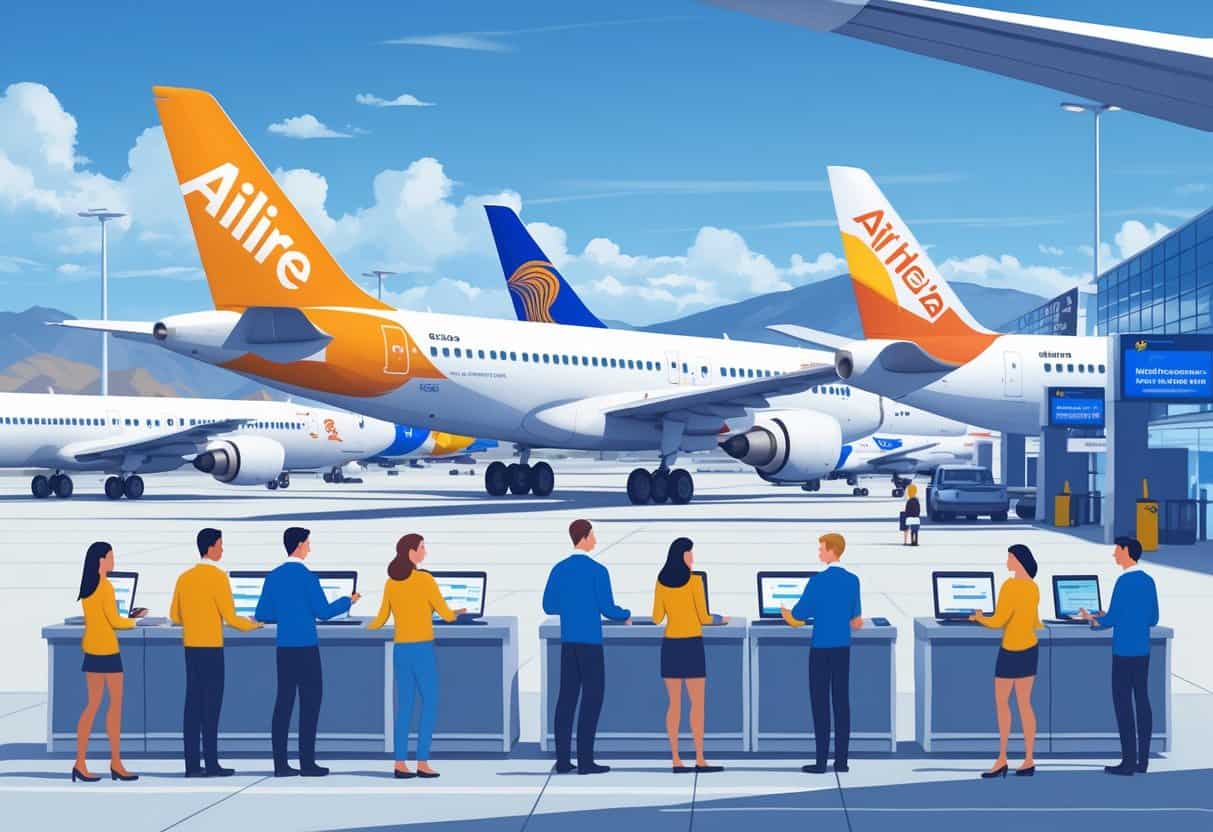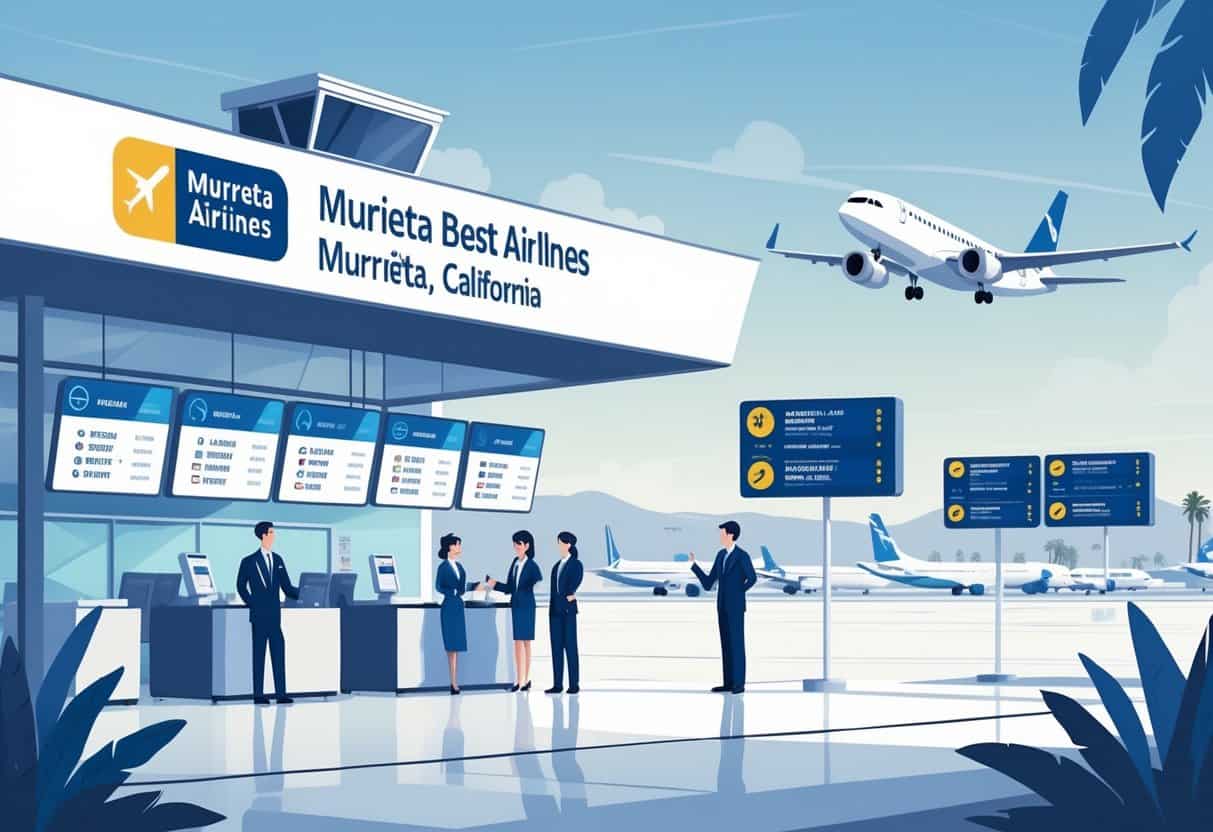Table of Contents
Traveling from Murrieta, California, means you might run into flight delays or cancellations just like anywhere else. Knowing which airlines handle these hiccups best can save you a lot of time, stress, and honestly, sometimes your sanity.
The airlines with the most flexible cancellation and delay policies are usually Spirit, Frontier, and United, making them good choices for travelers from Murrieta.

Every airline has its own rules for rescheduling, refunds, and support when things go sideways. Some let you change your plans without extra fees or get help faster if your flight gets canceled.
You’ll want to know how easy it is to track your flight or talk to a real person when you need help. These details can really matter when your travel plans suddenly change.
Key Takeways
- Airlines differ in how they handle flight delays and cancellations.
- Flexible policies can reduce your costs and stress during disruptions.
- Quick support and clear information improve your travel experience.
Overview of Airline Delay and Cancellation Policies in Murrieta

If you’re flying out of Murrieta, it’s smart to know how airlines deal with delays and cancellations. This stuff affects your trip, your wallet, and how much help you can get if things go south.
Airlines all have their own rules and compensation policies. It pays to know what you’re getting into.
Key Regulations and Consumer Rights
Federal rules say airlines have to give you info and help if your flight is delayed or canceled. If you’re stuck for more than 12 hours, you could get up to $500 per ticket.
For cancellations, the compensation can go up to $10,000 per person, with a $20,000 cap per trip. Airlines should offer rebooking, refunds, or even accommodations depending on what happened.
You’ll want to keep your ticket and receipts handy. You’ll need them to get your money back or file a claim.
Comparison of Major Airlines Serving Murrieta
Southwest Airlines is known for a low cancellation rate, around 0.83%, which is pretty solid. Frontier Airlines, though, cancels more flights, so that’s something to keep in mind.
Delta Air Lines gives you clear steps for dealing with delays or cancellations within 72 hours of your flight. Ticket prices vary, but always hang onto your purchase info for claims.
Each airline’s approach to customer service and delays can totally change your trip. It’s worth picking based on how flexible and helpful they are when things go wrong.
Airline-Specific Policies and Performance
Every airline does things a bit differently when it comes to delays and cancellations. Some focus on clear refund rules, others on flexible rebooking or extra care.
Knowing these little differences can make a big difference when your plans get disrupted.
Premier Air Charter, Inc: Delay and Cancellation Policy
At Premier Air Charter, Inc, if your flight’s delayed more than two hours, you can reach out to customer service for updates or to rebook.
If they cancel your flight, you get to pick between a full refund or a free reschedule. They try to keep you in the loop early on.
Premier sometimes waives cancellation fees if you give them a heads up. That’s a nice touch if your plans change.
Tipp Aviation, LLC: Disruption Handling Procedures
Tipp Aviation, LLC has a pretty clear process when flights get disrupted. If you’re delayed, you can check updates online or talk to customer service.
If the delay is over three hours, you can change your booking without paying extra. For cancellations, they’ll refund you or put you on a new flight within two weeks.
During long delays, they might help with meal vouchers or hotel stays, but it depends on the situation.
Altair International Corp: Traveler Support Initiatives
Altair International Corp tries to make delays and cancellations less painful. If your flight’s disrupted, they’ll work to rebook you on the next one out.
Their customer service team is available by phone or chat, which is handy. In some cases, they’ll give you a partial refund if the delay is bad enough.
They also offer flexible changes for frequent flyers, which is a nice perk. Their main thing is keeping you updated and supported through the mess.
Financial and Legal Considerations
When you’re looking at airline policies for delays and cancellations, it helps to know how laws and money shape what they do. Regulations can affect how airlines report problems and how stable they are.
Impact of the Securities Exchange Act of 1934
The Securities Exchange Act of 1934 says public airlines have to share accurate financial info regularly. It’s meant to keep things transparent.
If an airline gets hit with a bunch of delays or cancellations, they have to tell investors about the financial impact. That way, you can get a sense of whether they can actually afford to compensate passengers or improve service.
This law also gives the SEC power to investigate fraud. Airlines can’t fudge the truth about delays or refunds, which protects you as a passenger or shareholder.
Analysis of Financial Condition and Statements
Checking out an airline’s financial statements can give you clues about how well they handle disruptions. Look at things like profits, debt, and available cash.
If an airline’s got plenty of cash and not much debt, they’re more likely to offer refunds or help when things go wrong. If money’s tight, you might be out of luck.
Quarterly and annual reports can show you trends in how they spend money and handle risk. It’s worth a look if you care about reliability.
Common Stock and Executive Compensation Implications
Shareholders—people who own common stock—can influence airline policies with their voting rights. If customer service stinks and stock prices drop, they might push for changes.
Executive pay is often tied to how the company performs financially. Sometimes that means leaders care more about profits than about making your trip smoother.
There can be conflicts if execs chase short-term gains over long-term passenger happiness. Knowing this might help you guess how an airline will react when problems crop up.
Additional Factors Affecting Flight Disruption Management
A lot can mess with your flight besides weather or technical stuff. How stable the airline is and how they handle your personal data can also affect how they deal with delays or cancellations.
Plan of Merger and Airline Stability
If an airline’s in the middle of a merger, expect some bumps. Schedules can get weird, and delays or cancellations might spike as they figure things out.
Leadership changes, route shuffles, or maintenance hiccups can cause temporary chaos. If the airline’s financially solid, they usually bounce back faster and handle disruptions better.
If they’re struggling, delays can drag on because they don’t have the resources to fix things quickly. Before you book, check if your airline’s merging or having financial trouble—it could save you a headache.
Customer Privacy and Data Protection
Your personal data matters a lot in airline disruption management. It’s especially important when it comes to rebooking and getting updates from the airline.
Airlines that actually respect your privacy will keep your info locked down and only touch it when it’s needed for your flight. If their data protection is sloppy, well, your details could end up in the wrong hands.
That kind of risk isn’t just about privacy—it can slow down your rebooking, too. Sometimes the airline has to untangle data messes before they can even help you.
It’s worth checking if an airline is upfront about how they use your information. Honestly, you want to stick with airlines that follow strict privacy laws and let you have a say in what happens to your data, especially when things go sideways.